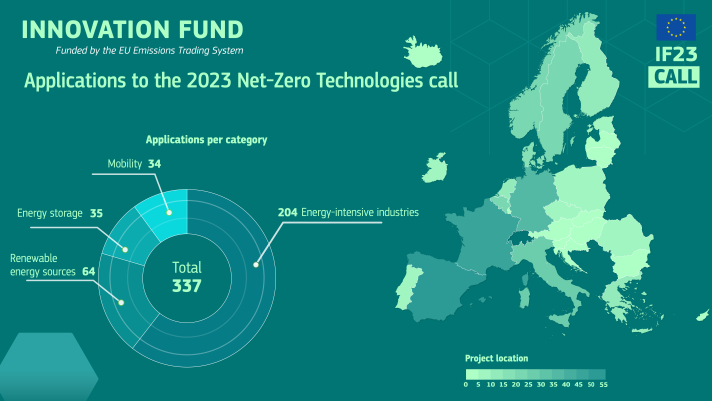
Innovation Fund: Tremendous Response to the 2023 Net-Zero Technologies Call
The Innovation Fund's 2023 call for net-zero technology proposals (IF23 Call) has garnered 337 applications from 27 countries. These proposals will compete for a €4 billion budget aimed at supporting the implementation of innovative clean technologies, financed by revenues from the EU Emissions Trading System (ETS).
The total requested funding amounts to EUR 24.6 billion, over six times the available budget. This investment could potentially reduce greenhouse gas emissions by an estimated 1.4 billion tonnes of CO2 equivalent within the first ten years of operation.
Applications across main categories supported by the Innovation Fund are as follows:
- 204 for energy-intensive industries, including carbon capture, utilization, and storage (CCUS)
- 64 for renewable energy, featuring innovations in solar, wind, and hydroelectric power
- 35 for energy storage, involving advancements in battery technology and grid storage solutions
- 34 for mobility, covering innovations in maritime, aviation, and road transport sectors
The IF23 call invited applications under five topics based on project scale, including a specific topic for cleantech manufacturing and pilot projects. The topic receiving the highest number of applications was general large-scale projects with 137 applications, followed by cleantech manufacturing with 56 applications, general medium-scale projects and pilots with 51 applications each, and general small-scale projects with 42 applications.
The IF23 Call’s notable number of applications and unprecedented €4 billion budget highlight the Innovation Fund's essential role in supporting European clean technology leaders and expanding the EU's manufacturing capacity for net-zero technologies. The EU remains committed to bolstering Europe’s cleantech manufacturing capacity, competitiveness, and supply chain resilience as outlined in the Net-Zero Industry Act. The results from this call reveal a significant potential to contribute to the EU’s proposed 90% greenhouse gas emissions reduction target set for 2040. These projects will also support the energy and climate goals of the Green Deal Industrial Plan, REPowerEU Plan, and the European Hydrogen Bank.
In terms of sectors, most applications pertain to chemicals and hydrogen. Thanks to the revised ETS Directive, newly eligible sectors have shown high interest, with over 70% of mobility category applications coming from maritime, followed by aviation and road transport.
For cleantech manufacturing projects, the budget has been doubled to €1.4 billion. Applications cover a wide range of technologies aimed at enhancing Europe’s innovation and industrial capacity and securing Europe’s strategic autonomy. The largest share of applications for component manufacturing targets hydrogen production, followed closely by components for the battery value chain, and various components for renewable energy sources, including solar, wind, and heat pumps.

